Exploring the Ocean with Ocean Ramsey: Conservation Focus
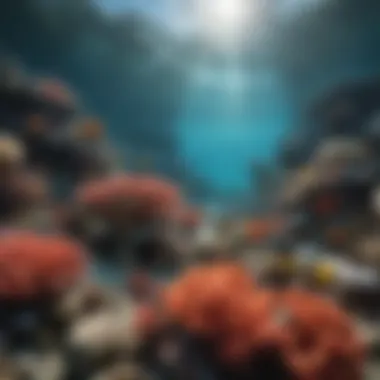
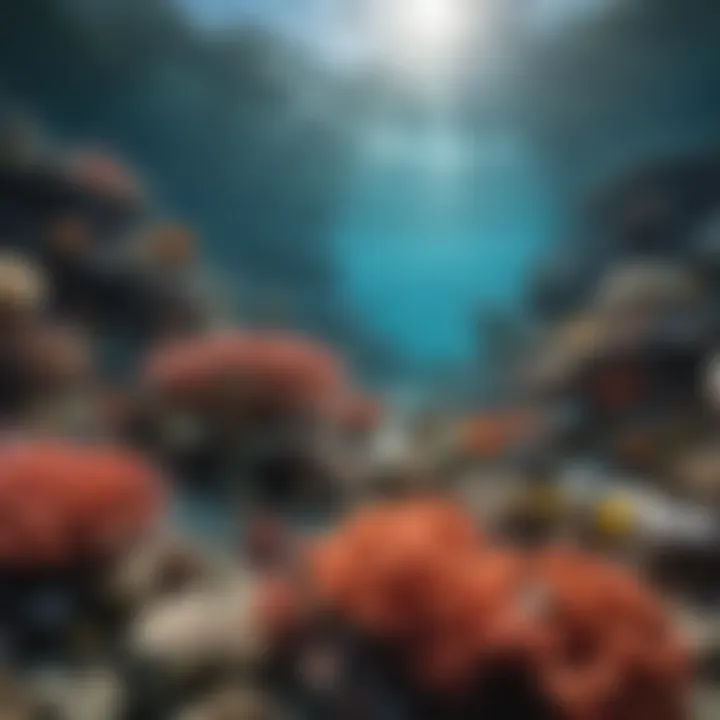
Intro
Ocean Ramsey stands as a powerful advocate for ocean conservation. Her dedication shines a light on the intricate dance between adventure and environmental awareness. Dive deep into her world, and you’ll uncover not just the thrill of the ocean's wonders, but also a passionate call for preserving its delicate ecosystems.
This article will take you through her journey, exploring the techniques and skills necessary for both novice and seasoned divers, while also presenting the essential equipment for safe and sustainable ocean exploration. Not only will we discuss her innovative methods, but we’ll also delve into the broader implications of her work for marine life and the underwater world as a whole.
To kick off this journey, we’ll look at the critical techniques and skills divers must acquire to navigate the ocean responsibly.
Intro to Ocean Ramsey
The introduction of Ocean Ramsey into the conversation of marine conservation is more than just an opening chapter; it sets the stage for a narrative intertwined with adventure and stewardship. As an influential figure, she has redefined what it means to be a diver in today's world. Her work not only highlights the wonders of marine life but also presses an urgent need for the protection of our oceans. This section aims to peel back the layers of her life, presenting a rich portrait of a woman who wears many hats: an advocate, an educator, and a thrill-seeker, all rolled into one.
It's crucial to appreciate how a solid foundation in personal history and professional motivation shapes one's impact on a cause as expansive as ocean conservation. The interplay of her early experiences and conscious choices informs the approach she takes in her endeavors, giving the audience a roadmap of sorts—demonstrating that every issue, no matter how large, often has a personal touch.
Understanding her journey is essential not only for those in the diving community but also for anyone interested in how passion and purpose can converge to forge significant change. The exploration into her background will illuminate the core principles guiding her work: empathy towards marine life, the desire for adventure, and a relentless pursuit of knowledge about the very ecosystems we strive to protect.
Background and Early Life
Ocean Ramsey grew up surrounded by the ocean's beauty, spending her formative years honing her skills and fostering a deep connection with the marine world. Her background paints a vivid picture of a childhood spent exploring tide pools and snorkeling in vibrant coral reefs. This foundation in nature shaped her understanding of aquatic environments and their ecological significance long before she started diving at a professional level.
While many kids might lose themselves in video games, Ocean was busy forging friendships with the ocean's inhabitants. Those experiences instilled in her a profound respect for marine life and an appreciation of its fragility.
Moreover, her early exposure to environmental issues, like the decline of certain fish populations and coral bleaching, sparked a fire of activism within her. As a young girl, she was already asking the difficult questions: "What can be done to save our oceans?" This climb into awareness proved pivotal in her personal narrative, informing her future vocation.
Pathway to Ocean Conservation
The journey from budding adventurer to prominent conservationist was not always linear for Ocean Ramsey. Rather, it unfolded through a series of realizations and experiences that transformed her as both a diver and an advocate for marine life. After completing her formal education, she began to pursue diving not merely as a sport but as a means for conservation.
Armed with a degree in marine biology, her commitment deepened as she recognized that diving could play a crucial role in educating people about the oceans' plight. This epiphany guided her efforts toward conservation initiatives that blend adventure with purpose. Ocean's determination to be a voice for the voiceless has led her to numerous collaborations with organizations that share her mission.
The path has also been paved with challenges; raising awareness about marine conservation isn’t always easy. Nonetheless, her willingness to step into the water—quite literally—has allowed her to bring important issues to light. Through thrilling underwater interactions with marine species, she captures people's imaginations while advocating for a sustainable and respectful relationship with the sea.
One Ocean Diving: Overview
Ocean Ramsey's venture, One Ocean Diving, holds a significant place within the realm of ocean conservation and adventure. This initiative is not merely about diving; it represents a profound commitment to preserve marine ecosystems while simultaneously promoting an understanding of their beauty. One Ocean Diving connects adventurous spirits with the ocean, fostering sustainability and respect for marine life.
Diving into this initiative offers numerous benefits. It brings together a community of divers and ocean enthusiasts who share a common goal: to protect and celebrate the ocean. Participants learn not just about the incredible underwater world but also engage in conservation practices that can make a tangible difference. This aspect distinguishes One Ocean Diving from typical diving experiences, which often overlook the ecological impacts of their activities.
"When you dive with purpose, every descent into the blue translates into a step towards ecological sustainability."
Mission and Vision
The mission of One Ocean Diving is straightforward yet ambitious: protect marine ecosystems while educating others. The vision encapsulates a world where people respect and understand the ocean, recognizing its intrinsic value and the threats it faces. It aspires to create deep connections between individuals and the ocean, paving the way for grassroots conservation efforts.
One Ocean Diving promotes responsible tourism that benefits both the environment and local communities. This vision transcends mere acknowledgment of the ocean's beauty; it aims to spark a desire for advocacy, motivating divers to become ocean stewards. The message is clear: if people appreciate what they experience beneath the waves, they are more likely to protect it.
Programs and Initiatives
One Ocean Diving offers a variety of programs and initiatives designed to engage the diving community in conservation efforts. Among these, several key initiatives stand out:
- Community Clean-Up Events: These events involve divers and non-divers alike in cleaning up local beaches and ocean areas. Such hands-on experiences not only improve the marine environment but also raise awareness about the impacts of pollution.
- Educational Workshops: These sessions cover diverse topics, such as coral reef health, species identification, and sustainable fishing practices. They are aimed at equipping participants with knowledge that promotes responsible diving and conservation.
- Research Collaboration Projects: One Ocean Diving partners with various marine researchers to support scientific studies on marine life and ecosystems. This collaboration helps contribute valuable data to ongoing conservation efforts.
- Advocacy Campaigns: The initiative includes active campaigns to advocate for policy changes aimed at protecting marine habitats. These campaigns help create a larger impact that goes beyond individual efforts.
The combined efforts of these programs allow One Ocean Diving to not only inspire, but to cultivate a culture of environmental responsibility within the diving community.
Diving Techniques and Practices
Diving is not just about slipping into the water and swimming amongst the fish; it embodies a blend of art and science that directly influences both the diver's safety and the integrity of the marine environment. For someone like Ocean Ramsey, who has made a name in ocean conservation, adopting the right diving techniques is vital. These concepts not only ensure safety during dives but also advocate a sustainable approach that balances adventure with preservation.
Fundamentals of Safe Diving
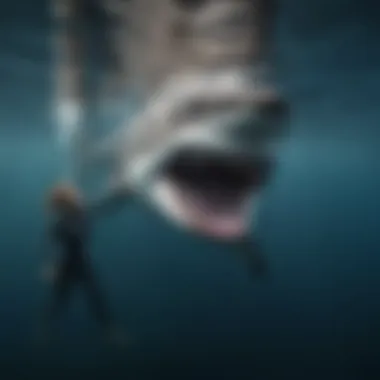
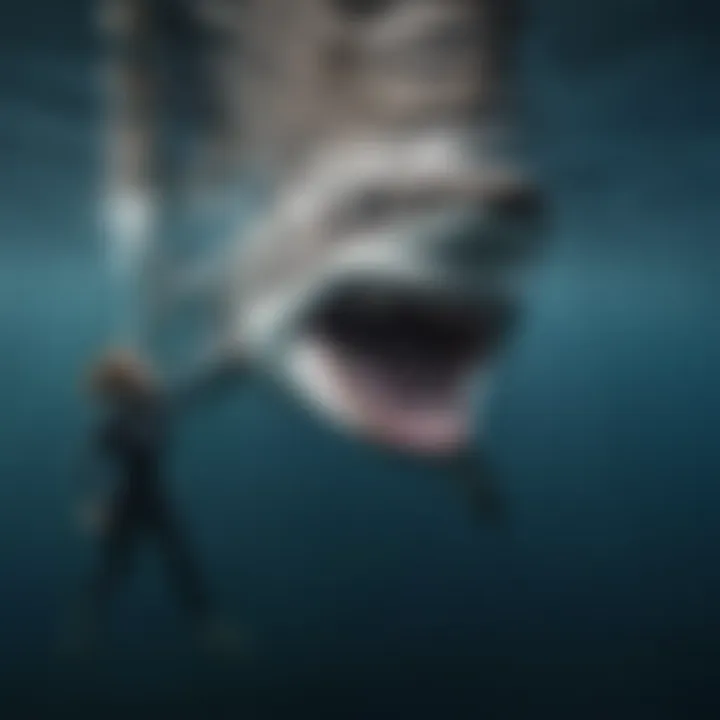
When we discuss safe diving, it’s hard to overstate its import. Divers must be conscious of their surroundings as well as their physical limits. Safety begins with a solid understanding of the ocean’s dynamics and the equipment used before taking the plunge.
- Pre-Dive Preparation: Divers should always check their gear meticulously—this includes testing oxygen tanks and regulator functions. A good rule of thumb is to perform a buddy check: each diver inspects the other’s equipment for any missed faults.
- Diving Plans: Establishing a dive plan that outlines objectives, entry and exit points, and contingency options is key. In a world where the unexpected is oftentimes lurking, having a strategy can make a significant difference.
- Know Your Limits: Divers should be honest about their skill levels. Overconfidence can lead to risky situations. It’s better to sit out a dive than to push beyond comfort zones.
- Awareness of Ocean Conditions: Weather, currents, and tides can rapidly change underwater scenarios. A dive in calm water can suddenly become treacherous due to shifting winds or currents. Understanding these factors cannot be underestimated.
"Awareness is the first step toward a safe dive. Knowing the ocean is key to survival and enjoyment."
— Ocean Ramsey
Sustainable Diving Methods
We live in a time where the health of marine ecosystems is hanging by a thread, and divers have a unique position to contribute positively. Sustainable diving practices should be at the forefront of every diver's mindset.
- Avoid Touching Marine Life: It might seem harmless, but even a gentle prod or touching can have long-term impacts on corals and other organisms. Divers should maintain a respectful distance from ALL marine life.
- Stay Off Coral: It's crucial to avoid standing or resting on coral reefs. These ecosystems are delicate, and even a slight disturbance can result in irreversible damage.
- Use Eco-Friendly Sunscreens: Chemical sunscreens can harm marine creatures. Opt for mineral-based or reef-safe sunscreens that won’t compromise the ocean environment.
- Responsible Waste Disposal: Littering, especially plastic items, is the bane of oceanic health. Always take trash back to land. Teaching divers about the impact of pollution fosters a culture of sustainability.
- Contribute to Citizen Science: Many diving organizations and research groups welcome data compiled by divers. Participating in such initiatives not only aids scientific understanding but also provides a sense of purpose during dives.
By integrating these principles into the routine of diving, not only do participants ensure their own safety, they contribute to the larger picture of marine conservation.
Understanding the importance of diving techniques and practices goes way beyond the thrill of swimming with dolphins or observing sharks; it’s about weaving adventure with a conscience towards preserving the beauty beneath the waves.
Marine Life Conservation
Marine life conservation stands as a crucial pillar in the sustainable management of our oceans. This significance is even more pronounced when considering the central role it plays in maintaining the balance of marine ecosystems. The oceans cover over 70% of the Earth’s surface and are home to a staggering diversity of life, from the tiniest plankton to the majestic blue whale. Protecting this biodiversity is not just beneficial; it's essential for the health of the planet as a whole.
Importance of Biodiversity
Biodiversity in marine environments fosters resilience. A rich variety of species means that ecosystems can adapt to changes, whether natural or human-induced. The employment of biodiversity helps in:
- Stabilizing ecosystems;
- Providing essential services such as carbon sequestration and nutrient cycling;
- Supporting livelihoods for millions of people worldwide, especially in coastal communities.
Moreover, the interconnectedness of marine species means that loss of any single species can have a ripple effect. For instance, the decline of predator species like sharks could lead to an overpopulation of smaller fish, which in turn might disrupt coral reef formations, affecting the myriad species that depend on them.
"Every creature has its role. If one vanishes, the whole system begins to wobble."
Threats to Marine Ecosystems
Despite the importance of marine life conservation, our oceans face numerous threats that put a strain on their delicate ecosystems. One of the foremost challenges is overfishing, which depletes fish stocks faster than they can regenerate. This not only threatens the species being targeted but disrupts the entire food web, affecting everything from plankton to larger fish.
Additionally, pollution plays a significant part in the degradation of marine environments. Plastics, chemicals, and waste materials from land all find their way into the seas. These contaminants jeopardize marine animals and habitats — think of sea turtles mistaking plastic bags for jellyfish or corals suffering from bleaching due to rising water temperatures and acidification.
- Climate Change: The impacts of climate change create stress on marine ecosystems in several ways, leading to elevated sea levels, increased ocean temperature, and altered currents, which in turn affect breeding and migration patterns.
- Habitat Destruction: Activities such as dredging, coastal development, and bottom trawling severely damage vital habitats like mangroves and seagrasses, which are crucial for marine life.
In summary, understanding the importance of marine life conservation and the threats that these ecosystems face is crucial for our collective future. As stewards of the ocean, throwing a lifeline to marine biodiversity not only preserves the beauty of our underwater world but also secures a healthier planet for generations to come.
Collaboration with Researchers
Collaborating with researchers is a pillar of meaningful conservation efforts. When it comes to ocean protection, partnerships between organizations and scientists can amplify the impact of any initiative. This is where Ocean Ramsey taps into her vast network. These collaborations streamline resources, align objectives, and provide scholarly backing that lends credibility to conservation projects.
Joint Studies and Projects
Ocean Ramsey has actively participated in various joint studies that bridge the gap between scientific research and practical conservation efforts. By collaborating with marine biologists and environmental researchers, she helps to gather essential data about marine ecosystems.
Some notable projects include:
- Tracking marine species migration patterns using advanced tagging techniques.
- Assessing the health of coral reefs through comprehensive mapping and health surveys.
- Researching the impact of human activities on marine biodiversity, which fuels advocacy for marine protected areas.
These initiatives not only contribute to scientific knowledge but also empower local communities by involving them in the data collection process.
Sharing Data for Conservation
Data sharing is like turning the light on in a dark room; it uncovers the truths about the ocean we might miss otherwise. Ocean Ramsey’s commitment to this practice is crucial. By making research data accessible, she paves the way for transparency and collaboration among conservationists and marine enthusiasts alike.
Some benefits of sharing data include:
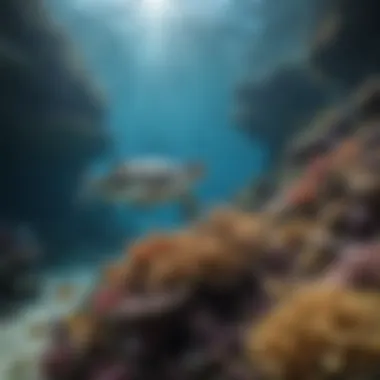
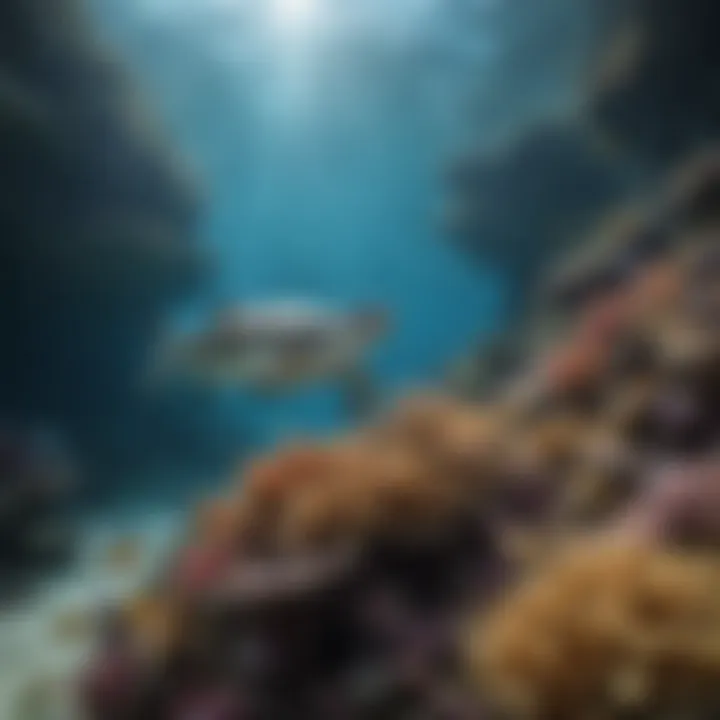
- Comprehensive Understanding: Access to varied datasets results in better-informed decisions regarding conservation practices.
- Increased Engagement: Public access to research findings invites a wider audience to participate in conversations about marine conservation.
- Cross-Disciplinary Approaches: By sharing data, different fields—like technology, environmental science, and sociology—can converge to form holistic strategies.
Collaborative efforts, like Open Science Initiatives, have successfully fostered a culture of shared knowledge. This ultimately enhances advocacy and informs public policies on marine conservation.
"In today's world, sharing knowledge can be the difference between thriving ecosystems and the loss of invaluable species." - Ocean Ramsey
In summary, the collaboration with researchers serves not just as a foundation for successful conservation operations, but also as a beacon for those who wish to contribute their efforts in protecting the ocean. Through partnership, the task of safeguarding our seas grows more attainable.
Educating the Public
Educating the public on ocean conservation is a linchpin in the effort to maintain underwater ecosystems. Knowledge acts as a tool, empowering individuals to make choices that directly impact marine environments. When people understand the intricate balance of life beneath the waves, they are more likely to engage in practices that protect these ecosystems. Ocean Ramsey has grasped this concept, drawing on her passion for diving and conservation to create educational initiatives that resonate with a wide audience.
Workshops and Outreach Programs
Workshops serve as a platform for immersive learning. By directly interacting with the ocean and its wonders, participants can develop a personal connection to marine life. These workshops range from hands-on activities like reef cleanups to informative sessions about the species that inhabit these waters.
- Engagement: Participants often leave these workshops armed with newfound knowledge, likely to share it with family and friends, creating a ripple effect.
- Diversity of Programs: Various programs are designed for different age groups, ensuring accessibility to all demographics. From school children to adults, everyone can find a way to connect with marine conservation.
- Real-World Implications: Through these initiatives, participants gain a broader understanding of how their everyday actions can have consequences for ocean health.
Furthermore, outreach programs often include collaborations with local communities. This cooperation helps foster a deeper understanding of the local ecosystem's challenges, making conservation a community effort. When residents can see how their livelihoods depend on healthy seas, the urgency for action becomes clearer. Thus, these programs do not just educate; they instill a sense of responsibility.
Using Social Media for Awareness
In this digital age, social media serves as a powerful conduit for spreading awareness. Ocean Ramsey effectively employs platforms like Instagram and Facebook to reach a global audience, amplifying the message of ocean conservation.
- Visual Impact: Compelling imagery of marine life can evoke powerful emotions. Stunning photos of coral reefs or majestic sharks can captivate viewers, pulling them into a narrative that emphasizes the beauty worth preserving.
- Engagement Metrics: Posts that encourage comments or shares often go viral, further spreading the conservation message. For instance, a simple post with a conservation tip can spark discussions among users, enhancing visibility.
- Creating Narratives: Storytelling, whether through a shared video of a diving expedition or a photo series, offers an intimate portrait of ocean life. By bringing the audience along on her underwater adventures, Ocean Ramsey connects their emotions to conservation effort.
A cohesive strategy on social media not only raises awareness about ocean conservation but also inspires action. When a post about a successful cleanup or a thriving marine sanctuary goes viral, it can mobilize communities to join similar initiatives.
"The ocean stirs the heart, inspires the imagination and brings eternal joy to the soul."
Personal Experiences of Ocean Ramsey
Personal experiences play a pivotal role in understanding the broader concept of ocean conservation and the adventurous spirit that propels it. For Ocean Ramsey, her diving adventures are more than just thrilling escapades; they embody her commitment to marine preservation and education. Real-life encounters with the ocean's wonders not only enhance her skills but also provide invaluable lessons about the fragility and beauty of marine ecosystems. These experiences shape her advocacy, allowing her to tell compelling stories that resonate with both the diving community and a wider audience.
Memorable Diving Adventures
Diving is a unique journey into another world, and Ocean Ramsey's memorable adventures reflect that truth in vivid detail. One such adventure took place in the clear waters of the Bahamas, where she had an unforgettable encounter with a group of magnificent hammerhead sharks. The thrill of swimming alongside these majestic creatures was both exhilarating and humbling. It was not just a moment of personal achievement but a vivid reminder of the delicate balance of marine life. This dive underscores the importance of sharks in ocean ecosystems, reinforcing her mission to protect these animals through advocacy and education.
In another instance, she explored the enchanting coral reefs of Palau. This dive illustrated the diversity of marine life and the complex interdependencies within these ecosystems. As she navigated the vibrant coral formations, Ocean Ramsey documented her encounters with various species, reinforcing her dedication to highlighting the urgent need for conservation. The experience was not merely about the thrill of diving; it was about capturing crucial data and sharing it with the wider community to inspire others to take action against coral bleaching and habitat destruction.
These adventures serve as powerful anecdotes to convey her message about the significance of marine conservation. Whether it’s the beauty of a coral garden or the grace of sharks gliding through the water, each dive contributes to a larger narrative about the ocean’s health and the urgent necessity for its protection.
Encounters with Marine Species
The moments of direct encounter with marine species are transformative, shaping attitudes towards ocean conservation. For instance, Ocean’s close proximity to gentle giants like the manta rays in Hawaii transformed her understanding of marine life dynamics. Watching these creatures gracefully glide through the water, she was reminded of their vulnerability to human actions like plastic pollution and commercial fishing practices. Such encounters deepen her resolve to protect their habitats and raise awareness about the threats they face.
Moreover, Ocean's experiences with dolphins off the coast of California were not just thrilling but offered insights into their intelligence and social structures. Observing these animals in their natural habitat highlighted the need for conservation efforts that respect their natural behaviors and migrations. Each interaction with marine wildlife becomes a lesson in empathy, urging her to use her platform to advocate for sustainable practices.
"The ocean's inhabitants are not just numbers in a report; they are living beings that play crucial roles in our ecosystem."
This perspective underscores the essence of her work: it's about forming connections with the marine world, advocating for its protection, and inspiring anyone who hears these stories to become stewards of the sea. Through these personal experiences, Ocean Ramsey weaves a narrative that is not only engaging but also enlightening, encouraging others to explore, understand, and work towards the preservation of our oceans.
Future Directions in Conservation Efforts
As the pressing issues surrounding ocean health become more apparent, the spotlight shines on innovative solutions and approaches to tackling these challenges. Future directions in conservation efforts are pivotal not just for the environment but also for the communities that depend on marine resources. The work of individuals like Ocean Ramsey not only highlights the ongoing and future efforts, but it also encourages a broader participation in ensuring the sustainability of our oceans.
Emerging technologies and creative engagement strategies play crucial roles in shaping how we approach marine conservation. It's not merely about recovery but transforming our relationship with the ocean, forging a proactive rather than reactive stance towards its protection.
Emerging Technologies in Research
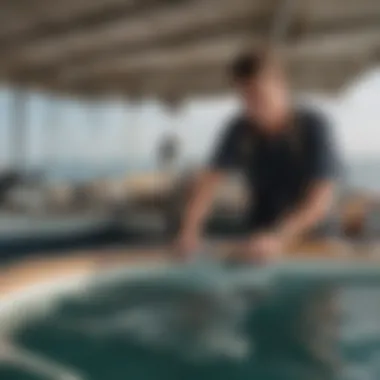
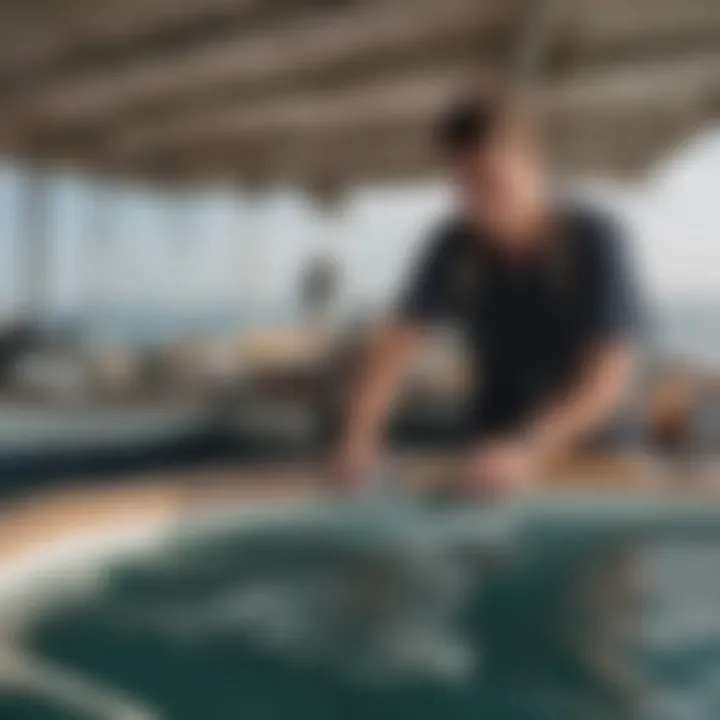
Research has always been a cornerstone of conservation. With technology evolving at breakneck speeds, the tools at our disposal are becoming more sophisticated and effective. For instance, advanced drone technology allows for aerial surveys of marine life, providing scientists and conservationists with real-time data that would have been hard to collect in the past. This is especially beneficial in tracking the populations of vulnerable species like sharks and manta rays.
Moreover, underwater drones, equipped with cameras and sensors, can venture into depths that are often inaccessible to divers. This allows researchers to gather vital information without impacting the delicate ecosystems below.
A few notable technologies include:
- Environmental DNA (eDNA) analysis: This method helps detect species in marine environments simply by analyzing water samples. It offers a non-invasive way to monitor biodiversity.
- Artificial Intelligence: AI helps in analyzing data collected from various sources, discerning patterns and aiding in the prediction of marine health.
- Remote Sensing: This technology monitors ocean conditions like temperature and chlorophyll levels, critical for understanding shifts in marine habitats.
Harnessing these cutting-edge tools not only enhances our understanding but also amplifies conservation efforts, making them more targeted and effective.
Innovative Approaches to Engagement
Engagement with local communities is another important aspect of future conservation efforts. Traditional methods of outreach are giving way to more inclusive, participatory approaches. Ocean Ramsey, for example, often fosters partnerships with local stakeholders to voice their experiences and concerns about marine resource management.
Some innovative tactics include:
- Community-led conservation initiatives: Empowering local fishermen and residents to take active roles in monitoring and protecting their waterways.
- Citizen Science Programs: By involving the public in data collection efforts, these programs not only increase the amount of data available for studies but also help raise awareness and education about marine ecosystems.
- Gamified learning experiences: Utilizing augmented and virtual reality apps to create immersive experiences that teach users about marine life and conservation in a fun, engaging way.
"Empowerment is the key to change. When communities take the lead, conservation becomes a shared journey."
These approaches not only broaden the scope of conservation efforts but also create a sense of ownership among those directly impacted by environmental changes.
Impact on the Diving Community
The influence of Ocean Ramsey on the diving community is multifaceted and far-reaching. Her unique methodologies and passionate advocacy for the ocean have sparked a wave of interest among divers and non-divers alike. With an impressive blend of adventure and environmental responsibility, Ocean highlights the interconnectedness of thrill-seeking and conservation. This symbiotic relationship nourishes a growing demographic of eco-conscious divers, who understand that their adventures come with a responsibility towards marine ecosystems.
Inspiration for Aspiring Divers
Ocean Ramsey serves as a beacon for those who yearn to explore the depths below while making a positive impact. She embodies the spirit of what it means to dive with purpose. Ocean's personal narrative—filled with daring underwater escapades paired with efforts to educate others—strikes a chord with aspiring divers. They look up to her not only for her diving prowess but also the way she intertwines art with advocacy.
Some key aspects of her influence include:
- Mentorship and Guidance: Ocean frequently engages with novice divers through workshops and training sessions, providing them with invaluable insights into diving techniques and safety protocols. Her enthusiasm is contagious, igniting a sense of wonder among new enthusiasts.
- Social Media Presence: By sharing captivating visuals and thoughtful commentary on platforms like Instagram and Facebook, she inspires the younger generation to appreciate marine life. This elevates awareness about ocean conservation, motivating more divers to adopt responsible practices.
- Collaboration with Conservation Organizations: Ocean works closely with various marine research groups, demonstrating to new divers that education and activism coexist. This partnership shows how divers can contribute to larger conservation efforts as they pursue their passion.
- Personal Storytelling: Her firsthand experiences often highlight the beauty and fragility of the ocean, making it easier for aspiring divers to connect emotionally with marine conservation.
In essence, Ocean Ramsey's passion for the sea radiates hope and a sense of urgency. She is not just a mentor; she is a trailblazer who redefines what it means to be an explorer underwater. Through her, many find the courage to forge their own paths in diving, knowing they can leave an indelible mark on the world—one ethical dive at a time.
Creating a Culture of Conservation
The diving community thrives on curiosity and exploration, but this should not come at the cost of the very ecosystems divers seek to marvel at. Ocean Ramsey's focal point on conservation has laid the groundwork for creating a culture that values sustainable practices within the diving fraternity. It is essential in a time when our ocean's health is increasingly threatened by human activities.
Key considerations in building this culture include:
- Awareness and Education: Ocean emphasizes that knowledge is power. Training sessions led by her often discuss the implications of polluting practices, overfishing, and coral bleaching. This awareness helps divers understand the critical roles they can play.
- Promoting Eco-Friendly Practices: Ocean inspires a shift from standard diving methods to more sustainable options. By using biodegradable materials, advocating for reef-safe sunscreens, and endorsing responsible wildlife interactions, she encourages divers to protect the environments they explore.
- Community Engagement: By fostering a sense of belonging, Ocean cultivates a community of divers who hold each other accountable. Group clean-up dives and local conservation projects become common threads that bind the diving community, reinforcing the importance of collective action.
"We dive not just for ourselves, but for the future of the ocean."
- Role Models: As experienced divers adopt conservation efforts, they motivate others to do the same. Ocean Ramsey serves as a prime example. When divers see tangible results from conservation efforts, it solidifies the belief that their actions matter.
As more divers embrace this culture of conservation, they become advocates, sharing their newfound knowledge and behaviors with others. This creates a ripple effect, leading to a greater emphasis on responsible diving practices throughout the industry. The impact of Ocean Ramsey, thus, extends beyond individual actions; she is nurturing a community committed to safeguarding the ocean for generations to come.
Ending
The conclusion of an article serves as a crucial element in cementing the reader's understanding of the discussions held. In the context of Ocean Ramsey's endeavors, this section encapsulates her journey and the broader implications of her work on ocean conservation. Highlighting the intricate connections between adventure and sustainability in diving, the conclusion allows readers to reflect on their own roles in environmental stewardship.
Reflecting on Ocean Ramsey's Journey
Ocean Ramsey's journey is not just a tale of adventure under the waves; it's a compelling narrative intertwined with a commitment to marine conservation. Starting from her early days, her passion for the ocean has been evident. Each dive reflects not only her skill but also her deep respect and love for marine life. As she navigated various waters, her experiences from encounters with majestic sharks to vibrant reefs have shaped her philosophy about preservation.
- Mentorship: Ramsey has often spoken about the importance of sharing knowledge. Through her expeditions and public engagements, she motivates others to delve into the underwater realm and learn from it.
- Conservation Efforts: The impact she has made through her conservation initiatives shines a light on ongoing threats facing marine ecosystems. Her relentless advocacy for protecting endangered species and habitats illustrates the urgency of action that is necessary.
By reflecting on her personal and professional experiences, we can glean insights into the importance of balancing adventure and responsibility towards our oceans.
Call to Action for Ocean Conservation
The need for individuals to engage in ocean conservation cannot be overstated. As the threats to marine ecosystems grow, it becomes imperative for everyone to consider their role in this struggle. Ocean Ramsey's work embodies a call to action that extends beyond mere words; it encourages tangible steps towards environmental preservation.
- Get Involved: Simple acts can have ripple effects. Whether it’s participating in local cleanup events, supporting sustainable seafood choices, or advocating for policies that benefit marine environments, everyone has a contributing role.
- Educate Others: Sharing knowledge is a powerful tool. Initiating conversations about ocean health within your community can inspire collective action.
- Support Conservation Organizations: Consider donating to or volunteering with organizations that align with your values. This can include groups focused on marine research, habitat restoration, or public education programs.







